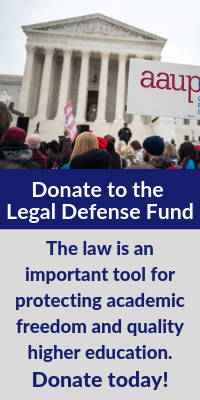On September 3, 2021, the AAUP submitted a brief to the Texas attorney general arguing against a request from a state legislator for an opinion on whether teaching certain ideas about race, including critical race theory (CRT), would violate “Title VI of the Civil Rights Act of 1964, the Equal Protection Clause of the Fourteenth Amendment, [or] Article 1, Section 3 and Section 8 of the Texas Constitution.” This request is part of a broader attack on teaching and training on the issues of racism and racial justice, manifested in proposed state laws limiting teaching on “divisive subjects” and in requests for state attorney general opinions forbidding such teaching. In advocating against the attempt to circumscribe teaching about racism, the brief focuses on Supreme Court First Amendment decisions and AAUP policy concerning the societal role of education, academic freedom, and teachers’ expertise in developing curriculum. Thus, the brief addressed the broader political themes that are behind many of these attacks on teaching and the AAUP policies applicable to these attempted infringements of academic freedom.


